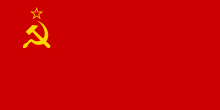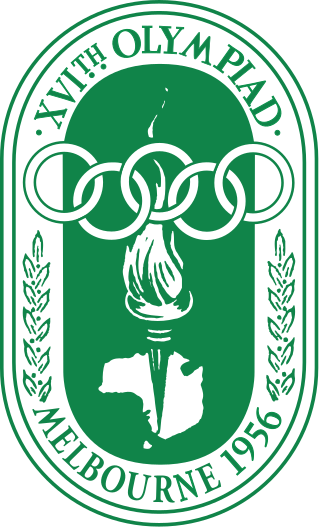
The 1956 Summer Olympics, officially known as the Games of the XVI Olympiad, were an international multi-sport event held in Melbourne, Victoria, Australia, from 22 November to 8 December 1956, with the exception of the equestrian events, which were held in Stockholm, Sweden, in June 1956.

Georgia competed at the 2004 Summer Olympics in Athens, Greece, from 13 to 29 August 2004. Georgian National Olympic Committee (GNOC) sent the nation's smallest delegation to the Games since the post-Soviet era. A total of 32 athletes, 26 men and 6 women, competed in 10 different sports.

Belarus competed at the 2004 Summer Olympics in Athens, Greece, from 13 to 29 August 2004. This was the nation's fifth appearance at the Summer Olympics in the post-Soviet era. The Belarus Olympic Committee sent a total of 151 athletes to the Games, 82 men and 69 women, to compete in 22 sports.

Latvia competed at the 2004 Summer Olympics in Athens, Greece, from 13 to 29 August 2004. This was the nation's eighth appearance at the Summer Olympics.

Kyrgyzstan competed at the 2004 Summer Olympics in Athens, Greece, from 13 to 29 August 2004. This was the nation's third appearance at the Olympics in the post-Soviet era.

Uzbekistan competed at the 2004 Summer Olympics in Athens, Greece, from 13 to 29 August 2004. This was the nation's third consecutive appearance at the Olympics. The National Olympic Committee of the Republic of Uzbekistan sent a total of 70 athletes to the Games, 52 men and 18 women, to compete in 13 different sports, tying its delegation record with Sydney four years earlier. There was only a single competitor in road cycling, artistic and trampoline gymnastics, and table tennis.

North Korea competed as the Democratic People's Republic of Korea at the 2004 Summer Olympics in Athens, Greece, from 13 to 29 August 2004. This was the nation's seventh appearance at the Olympics since its debut in 1972. North Korean athletes did not attend the 1984 Summer Olympics in Los Angeles, when they joined the Soviet boycott, and subsequently, led a boycott at the 1988 Summer Olympics in Seoul, along with six other nations.

The Union of Soviet Socialist Republics (USSR) first participated at the Olympic Games in 1952, and competed at the Summer and Winter Games on 18 occasions subsequently. At six of its nine appearances at the Summer Olympic Games, the Soviet team ranked first in the total number of gold medals won, second three times, and became the biggest contender to the United States' domination in the Summer Games. Similarly, the team was ranked first in the gold medal count seven times and second twice in its nine appearances at the Winter Olympic Games. The Soviet Union's success might be attributed to a heavy state investment in sports to fulfill its political objectives on an international stage.
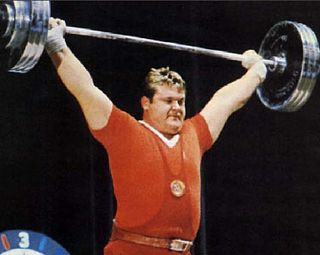
Leonid Ivanovich Zhabotinsky was a Soviet and Ukrainian weightlifter who set 19 world records in the superheavyweight class, and won gold medals at the 1964 and 1968 Olympic Games.

The Philippines competed at the 2008 Summer Olympics in Beijing, China. The country was represented by 15 athletes, 10 men and 5 women, who competed in 17 events across 8 sports.

Israel has competed at the Olympic Games as a nation since 1952. Its National Olympic Committee was formed in 1933, during the British Mandate of Palestine. Israel has sent a team to each Summer Olympic Games since 1952, and to each Winter Olympic Games since 1994. The country became a member of the European Olympic Committees (EOC) in 1994.
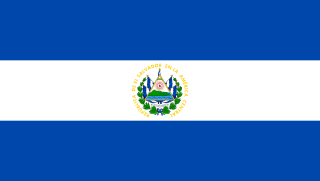
El Salvador first competed in the Olympic Games at the 1968 Summer Olympics in Mexico City, Mexico. It has participated in every Games of the Olympiad since that time, excluding those held in 1976 and 1980, when the nation joined the American-led boycott in protest of the Soviet invasion of Afghanistan. They have never competed in the Olympic Winter Games. El Salvador has not earned a medal at any Olympic Games.

The Oceanic island nation of Kiribati competed at the 2012 Summer Olympics in London, held from July 27 – August 12, 2012. This was the nation's third appearance at the Olympics.
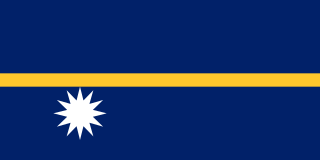
Nauru competed at the 2012 Summer Olympics in London, which was held from 27 July to 12 August 2012. The country's participation at London marked its fifth appearance in the Summer Olympics since its debut at the 1996 Summer Olympics. The delegation consisted of two participants: Sled Dowabobo in the men's lightweight judo contest and Itte Detenamo in the men's super-heavyweight weightlifting competition. Dowabobo qualified as one of Oceania's highest ranked judo competitors while Detenamo made the Games based on his qualifying performance. Detenamo was the flag bearer for both the opening and closing ceremonies. Dowabobo was eliminated by his opponent Navruz Jurakobilov in the round of 64 and Detemano was 14th in his event.

Alexey Sidorovich Medvedev was a Soviet-Russian heavyweight weightlifter who won European titles in 1956 and 1958 and world titles in 1957 and 1958. On 15 March 1959, he set a world record in the snatch.
During the parade of nations portion of the 1984 Summer Olympics opening ceremony, athletes from each country participating in the Olympics paraded in the arena, preceded by their flag. The flag was borne by a sportsperson from that country chosen either by the National Olympic Committee or by the athletes themselves to represent their country.
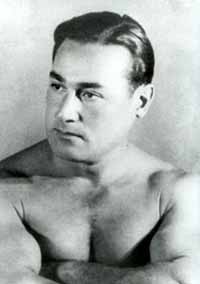
Yakiv Hryhorovych Kutsenko was a Ukrainian heavyweight weightlifter. Between 1946 and 1950 he won two European titles and two silver medals at world championships, both times losing to John Davis. He was the Soviet heavyweight champion between 1937 and 1952, and in 1947 set three official world records in the clean and jerk.

Kiribati competed at the 2016 Summer Olympics in Rio de Janeiro, Brazil, from August 5 to 21, 2016. This was the nation's fourth consecutive appearance at the Summer Olympics.

